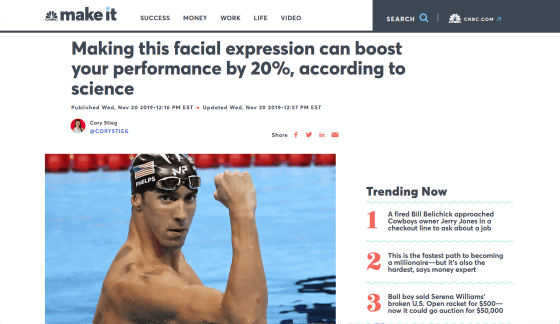It turns out that making a `` serious expression '' improves the performance of cognitive tasks

by
When you are concentrating to solve a difficult problem or lifting a heavy object, you may have a “serious expression” without knowing it. Research results have been reported that deliberately creating such a serious expression improves cognitive task performance.
Game Face Expressions and Performance on Competitive Tasks-Richesin--Stress and Health-Wiley Online Library
https://onlinelibrary.wiley.com/doi/abs/10.1002/smi.2899
Get your game face on: Study finds it may help | EurekAlert! Science News
https://www.eurekalert.org/pub_releases/2019-11/uota-gyg111419.php
Study: Facial expression that improves cognitive performance
https://www.cnbc.com/2019/11/20/study-making-a-determined-face-improves-cognitive-performance.html

Many people think of a serious expression as if they were frowning like wrinkling their foreheads, narrowing their eyes, and putting their power in their mouths. I tend to have such a “serious expression” when I ’m serious about things, but at first glance it looks “angry”.
For example, swimmer
Michael Phelps Gets a Life-Size Cutout of His Angry Olympic Face-YouTube
The moderator who talked with Mr. Phelps took out Mr. Phelps's photo board, which became a hot topic, saying 'I have a great face.' Mr. Phelps on the far left also laughs unintentionally.

If you zoom in on the board, you will be satisfied with the expression even if you are told that you are angry. Because of the camera angle at the time of the broadcast, it was

Serious facial expressions are sometimes tricked like Phelps, but the research team
The two experiments consisted of a task of “participating in water with a water temperature of 3 to 5 degrees and enduring it to the limit” and “complete a complex puzzle of 100 pieces in 5 minutes as much as possible. Is given a task. In both experiments, half of the participants were shown a photograph of an athlete with a serious expression, and were told, “Please make a serious expression like this athlete during the task,” and the rest. Half were not given special instructions.
As a result of the experiment, the time to withstand ice water did not extend even with a serious expression, but it seems that the cognitive task of completing the puzzle has improved greatly. People with serious facial expressions averaged 4.13 more puzzle pieces in 5 minutes compared to the control group. Also, in experiments, stress responses were checked by measuring participants' heart rate, skin conductance, etc., and it was reported that people with serious expressions were able to recover quickly from task stress.
Although this study is small, 2010 research and 2019 meta-analysis show that floating facial expressions affect performance and emotions. Matthew Richesin, the lead author of the paper, said, “If you have the potential to improve performance by creating serious expressions, this concept may be applied more broadly, not just in sports. 'No.'

by reidy68
Related Posts:







